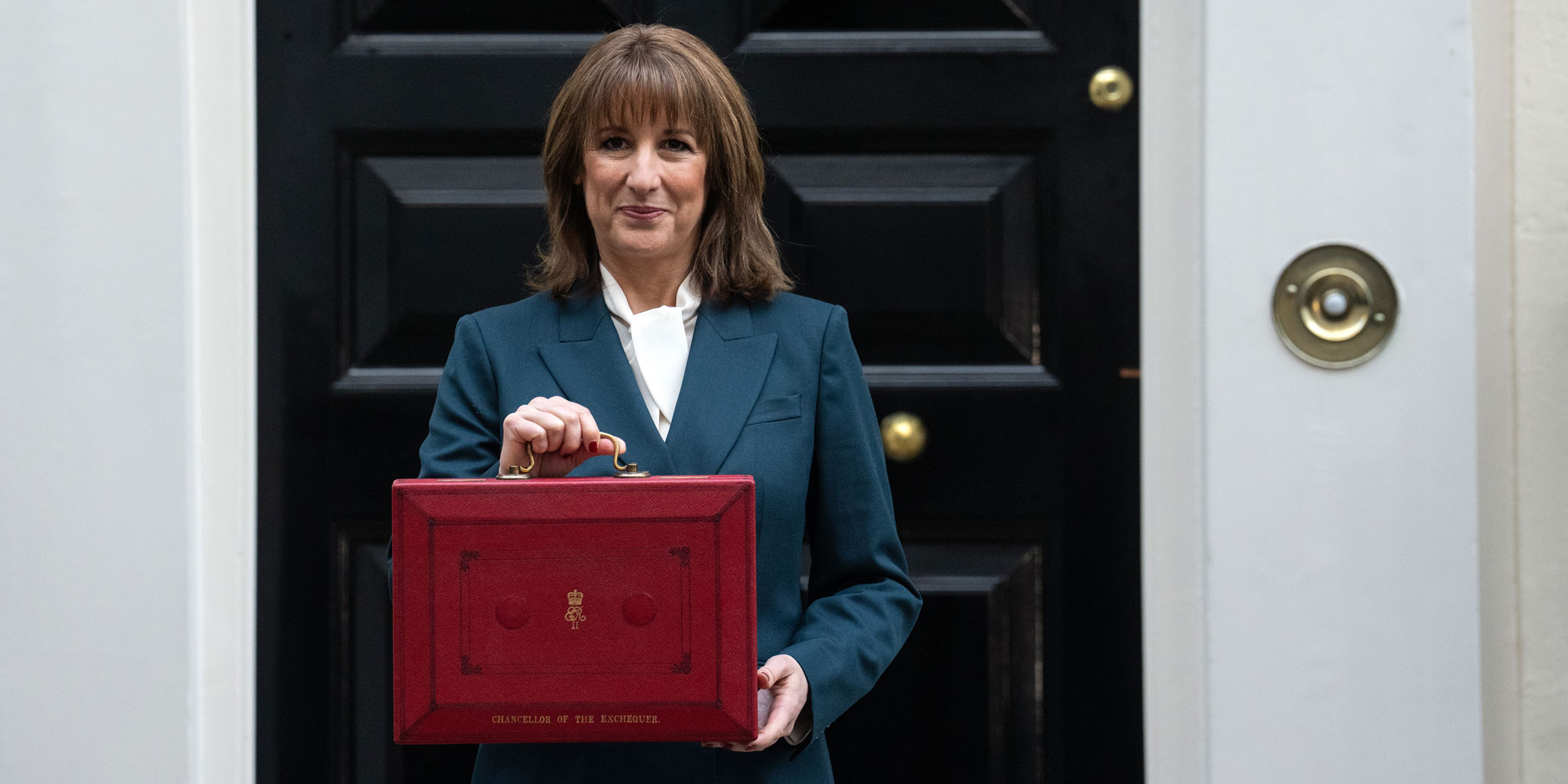
Check your finances are retirement-ready
The specialists at Destination Retirement can help you plan with confidence.
Book a free chatWhich? earns a commission to fund its not-for-profit mission if you buy a product via this service
By clicking a retailer link you consent to third-party cookies that track your onward journey. This enables W? to receive an affiliate commission if you make a purchase, which supports our mission to be the UK's consumer champion.

Chancellor Rachel Reeves unveiled her Autumn Budget today (26 November), announcing £26bn of tax rises, including an extension to a freeze on income thresholds, cash Isa allowance cuts, and a new 'mansion tax'.
During her statement in the House of Commons, Reeves promised her package of changes will cut the cost of living, bring down inflation, and provide relief to families.
Here, we take a closer look at what was included in the speech, and how it will affect your finances.
Details about what will be included in today's Autumn Budget have been leaking for months now, and an unprecedented slip-up meant we knew about several of the main reforms before the Chancellor had even begun talking.
Now the wait is over, we run you through the changes announced and what it will all mean for your money:
A two-percentage-point rise to the rate of income tax on dividend and savings interest income will kick in from April 2026 and 2027, respectively.
Let's break that down:
When you earn interest above a certain amount, it's subject to income tax. Previously, the thresholds for tax on savings interest were the same as those for other forms of income (in England, Wales and Northern Ireland), such as employment or a pension.
The amount of tax charged on interest earned above your personal savings allowance will increase as follows from April 2027.
Find out more: Chancellor to raise tax on savings
If you get income in the form of dividends, for example from company shares or funds and investment trusts, you'll also pay more tax. Here's what's changing from April 2026:
Additional-rate taxpayers will continue to pay the same rate of 39.35%.
The Chancellor will extend the freeze on income tax and National Insurance thresholds for a further three years from 2028-29. That's despite promising in last year's Autumn Budget to unfreeze it and raise it in line with inflation.
It means the basic-rate, higher-rate threshold and additional-rate thresholds will stay at £12,570, £50,270 and £125,140, respectively.
The freeze is often referred to as a 'stealth tax' because it leads more people to be pulled into higher tax bands as their income increases.
The amount you can save in a tax-free cash Isa will fall from £20,000 a year to just £12,000 from April 2027.
The overall Isa allowance of £20,000 will stay the same, but only if £8,000 of it is held in a stocks and shares product.
People over the age of 65, however, will still be able to put the full £20,000 into cash.
The limit on the amount of salary that can be exchanged for extra pension contributions without incurring National Insurance Contributions (NICs) will be capped at £2,000.
Right now, there's no limit on how much salary you can put into a pension through salary sacrifice schemes before it becomes subject to NI.
But from April 2029, the employee will pay the full NI rate on contributions above that limit. This is 8% on earnings under £50,000 and 2% on higher income.
Government figures show that roughly a third of private sector employees and almost 10% of public sector workers use salary sacrifice arrangements.
Reeves also confirmed that the pension tax-free cash allowance will remain unchanged. Ahead of the Budget, there was speculation that the government might reduce the size of the tax-free lump sum people can withdraw from pensions after the age of 55.

The specialists at Destination Retirement can help you plan with confidence.
Book a free chatWhich? earns a commission to fund its not-for-profit mission if you buy a product via this service
A new ‘mansion tax’ will be introduced from 2028 and collected via your council tax bill.
The High Value Council Tax Surcharge will be £2,500 for properties worth more than £2m, rising to £7,500 for properties worth more than £5m.
It will be owed by the property owner rather than the occupier and collected alongside council tax.
Homes will be charged based on 2026 property prices. Charges will increase by CPI inflation each year from 2029-30 onwards and the thresholds will be reviewed every five years.
It's expected to raise £400m for the government.
Property income tax will rise by two percentage points from April 2027, increasing the basic rate from 20% to 22%, the higher rate from 40% to 42% and the additional rate from 45% to 47% across England, Wales and Northern Ireland.
Scotland is not affected, though similar changes could be introduced in the Scottish Budget on 13 January.
The national living wage for those aged 21 or over will rise by 50p an hour to £12.71.
The biggest rise will be seen for those aged 18-20, at 85p. The government says this marks further progress towards its goal of phasing out 18-20 minimum wage bands and establishing a single adult rate.
The apprentice rate and for those under 18 will rise by 45p an hour to £8.
According to the government, the rise will increase gross annual earnings of a full-time worker aged 21 or over by £900 and will benefit around 2.4 million low-paid workers – and 2.7 million people overall.

Make every penny count with expert, impartial advice for just £49 a year – plus, get a £10 M&S voucher.
Join Which? MoneyJoin by midnight on 15 February 2026 and receive a £10 M&S gift card.
If you claim benefits, you'll be affected by the following changes:
The two-child benefit cap will be lifted from next April. The policy currently prevents families from claiming the Universal Credit child element – worth £292.81 a month – for a third or subsequent child born after 6 April 2017.
From April, families will be eligible for £3,647 per child per year for all children in their household born after April 2017 (taking into account the inflation-based benefits uplift of 3.8%).
The change will increase benefit payments to 560,000 families by an average of £5,310, according to the Office for Budget Responsibility.
Luxury cars will no longer be included in the government's Motability scheme, which provides cars to disabled people through the benefits system.
It means models such as BMWs and Mercedes, currently leased by more than 40,000 claimants, will be removed from the scheme.
Rates on fuel duty – a tax included in the price you pay for petrol, diesel and other fuels – will be frozen at its current rate until September 2026.
It means the temporary 5p per litre cut, first introduced in 2022, will remain.
Petrol stations will be forced to share up-to-date fuel prices via a new, government-run Fuel Finder system to help motorists find the lowest prices and to increase competition.
Drivers of EVs will be subject to a 'mileage-based charge' on battery electric and plug-in hybrid cars from April 2028.
For each mile an EV drives a 3p charge will be added to the amount of tax that’s due to be paid. In addition, owners of plug-in hybrid cars will pay 1.5p per mile, irrespective of how far they drive on electric or petrol power.
When car owners renew their car tax each year, they will be asked to estimate the number of miles they’ll drive in the next 12 months, and then pay that cost upfront alongside their road tax, or spread the cost over the year.
The OBR estimates that an EV driver travelling 8,500 miles during this period will pay an additional £255 from the mileage-based charge – said to be roughly the equivalent of half the rate of fuel duty tax paid by petrol and diesel drivers.
Rail fares are to be frozen for the first time in 30 years from 2026. The government announced that the freeze will apply to all regulated fares.
Regulated fares include season tickets on most commuter journeys, some off-peak return tickets on long-distance journeys, and anytime tickets around major cities. Unregulated fares are set by train operating companies at commercial rates, and include first-class and advance purchase fares.
Ministers said a typical commuter travelling to work three days a week using flexi-season tickets will save £315 a year travelling from Milton Keynes to London, £173 travelling from Woking to London and £57 from Bradford to Leeds.
The change will apply to England and services run by English train operating companies.
The state pension will rise by £575 from April 2026. That's in line with the 'triple lock' that guarantees payments will increase by either September's inflation figure, average earnings growth between May and July, or 2.5% – whichever is higher.
Last month, the Office for National Statistics (ONS) confirmed that September's rate of inflation was 3.8%, while wage growth sat at 4.8%.
In her Budget speech, the Chancellor confirmed that state pensioners will see a 4.8% boost in their payments from April.
NHS prescription charges in England will remain at £9.90 for another year after the government announced a freeze for 2025-26. The price of prepayment certificates is also staying the same.
No changes were announced to medications that are currently free. That includes contraceptives and drugs administered to patients in hospital.
You may also qualify for free prescriptions due to your age, your income and whether you receive certain means-tested benefits, and if you have certain medical conditions.

Use our advice, ratings and customer scores to help you choose with confidence
Compare and chooseThere was bad news for drinkers, as it was announced that alcohol duty would go up by 3.66%, in line with Retail Price Inflation (RPI).
Tobacco duty rates will also increase by RPI inflation figure plus an extra 2%.
From 1 Oct 2026, a new flat vaping duty will also be introduced, levied at £2.20 per 10ml of liquid. That was already announced in last year's Autumn Budget but confirmed again by the Chancellor today.
Latte lovers will be disappointed to hear that pre-packaged milkshakes and coffees that are high in sugar will be hit with an extra tax from 2028. The threshold at which the tax applies will be lowered from 5g to 4.5g of sugar per 100ml.
Gambling will also take a hit. From April 2026, the remote gaming duty will rise from 21% to 40%, while online betting will rise from 15% to 25%. In-person gambling rates and remote bets on racing will stay the same.